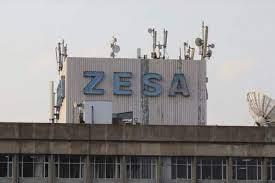News / National
Zimbabwe wastes 20% of supplied electricity
08 Sep 2024 at 09:01hrs |
0 Views

Zimbabwe is facing significant electricity inefficiencies, with the Zimbabwe Energy Regulatory Authority (ZERA) reporting that up to 20% of supplied electricity is wasted due to obsolete equipment and other challenges.
According to Victor Sibanda, a research and energy efficiency engineer at ZERA, this wastage is exacerbated by outdated technology and careless use, leading to substantial losses. The country's national grid connectivity stands at 62%, with urban areas having over 80% access and rural areas only 23%.
The energy mix in Zimbabwe includes thermal power (41.8%), hydropower (34.6%), independent power producers (3.9%), and imports (19.8%). Despite this diverse mix, the inefficiencies in electricity usage mean that 20% of the electricity being imported is essentially used to compensate for the wastage. Sibanda highlighted that old equipment, including electric motors, often loses efficiency over time, leading to further losses.
Sibanda pointed out that Zimbabwe's power generation infrastructure is outdated and less efficient compared to other countries. For example, South Africa generates 2.2 units of energy per unit of electricity, while Ghana produces 0.8 units. This inefficiency indicates a need for upgrading the country's power generation equipment to improve overall performance.
The current power generation capacity in Zimbabwe is struggling to meet demand, with the country generating 1219 megawatts against a peak demand of at least 2000 megawatts. The major power sources include Kariba generating 215 MW and Hwange 1219 MW, while Munyati, Harare, and Bulawayo are currently down. The rolling outages lasting over 15 hours a day reflect the strained capacity and highlight the urgent need for infrastructure improvements.
Sibanda also emphasized the importance of information and communication in addressing energy issues. A lack of proper information can hinder progress, whether it's from those providing the service or the intended recipients. Upgrading equipment and improving information flow are crucial steps toward resolving the energy crisis and ensuring a more reliable electricity supply for Zimbabwe.
According to Victor Sibanda, a research and energy efficiency engineer at ZERA, this wastage is exacerbated by outdated technology and careless use, leading to substantial losses. The country's national grid connectivity stands at 62%, with urban areas having over 80% access and rural areas only 23%.
The energy mix in Zimbabwe includes thermal power (41.8%), hydropower (34.6%), independent power producers (3.9%), and imports (19.8%). Despite this diverse mix, the inefficiencies in electricity usage mean that 20% of the electricity being imported is essentially used to compensate for the wastage. Sibanda highlighted that old equipment, including electric motors, often loses efficiency over time, leading to further losses.
Sibanda pointed out that Zimbabwe's power generation infrastructure is outdated and less efficient compared to other countries. For example, South Africa generates 2.2 units of energy per unit of electricity, while Ghana produces 0.8 units. This inefficiency indicates a need for upgrading the country's power generation equipment to improve overall performance.
The current power generation capacity in Zimbabwe is struggling to meet demand, with the country generating 1219 megawatts against a peak demand of at least 2000 megawatts. The major power sources include Kariba generating 215 MW and Hwange 1219 MW, while Munyati, Harare, and Bulawayo are currently down. The rolling outages lasting over 15 hours a day reflect the strained capacity and highlight the urgent need for infrastructure improvements.
Sibanda also emphasized the importance of information and communication in addressing energy issues. A lack of proper information can hinder progress, whether it's from those providing the service or the intended recipients. Upgrading equipment and improving information flow are crucial steps toward resolving the energy crisis and ensuring a more reliable electricity supply for Zimbabwe.
Source - the standard
Join the discussion
Loading comments…


































